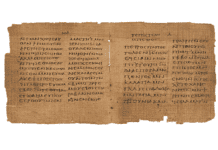“The point of all of this,” said McCaulley, “is that the Bible speaks very clearly about the ability of people in power to use that power to exploit those who are most vulnerable.”
Another point to consider is that the authors of the Psalms talk about God defending the oppressed. The reason why anyone has to rely on God to defend the oppressed is because human institutions have failed to do so. “Why does God have to defend the orphans and widows?” asked McCaulley. “Because the people have not defended the orphans and widows.” Furthermore, when Scripture speaks of the coming Messiah, one of his main jobs will be to accomplish justice on behalf of those who need it.
McCaulley was clear that the Bible shows us sin is individual as well as corporate. Isaiah 1:23 rebukes leaders who take bribes and oppress orphans and widows, but verse 29 rebukes individuals for their idolatry. Isaiah 5:8 speaks judgment against those who buy up houses so that the poor have nowhere to live, but verse 11 chastises people for their drunkenness. “The Bible then doesn’t only address personal sin or only address corporate sin,” said McCaulley, “but the Bible sees both of these things as a manifestation of human brokenness.”
However, some Christians think that when pastors address corporate sin, they are letting their political views overshadow biblical truths. “If I were to give a sermon about the problems of idolatry,” said McCaulley, “if we were to talk about personal morality, these things would be seen as being biblical. If we started talking about what Isaiah says about corrupt politicians who use their offices to exploit the poor, that is seen as being political. But in the Old Testament, all of these things are seen as rebellion against God.”
When it comes to the New Testament, it is interesting to note we are told Jesus has authority and dominion over all other powers and authorities. These powers are not just earthly, but include evil, demonic powers that influence humanity. One question that follows from this, said McCaulley, is, “Would the powers of evil that have control of this age have a vested interest in creating structures of inequality that oppress certain ethnic minorities?” He believes the answer is unquestionably, “Yes.” Another relevant question then is, “Is the United States exempt from being under the power of the present evil age?” Clearly, it is not.
So does systemic racial sin exist in the U.S. today? “The collective experience of African Americans, especially people of faith, matters,” said Esau McCaulley. “And the fact that we can say that we experienced these things is not something lightly dismissed.”
Therefore, concluded the reverend, not only does systemic racial sin exist, but God hates it. And as his followers, we should fight the systemic racism present in modern America. “As people who are trying to reflect God’s concerns in the world,” he said, “part of our work doing Christian ministry is engaging in the kinds of things that God engages in as a manifestation of his character. So if God is the one who is the defender of the weak and the disinherited, then part of the work of the church is to join God in the work of defending the needy.”











